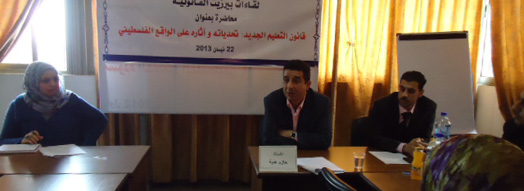The New Gaza Education Law : Effects and Challenges
Organised at the IoL Gaza Office, the presentation was made by Advocate Hazem Haniyeh, Coordinator of the Policy and Studies Unit at the Independent Commission for Human Rights (ICHR), Gaza Strip Programme.
The legal encounter brought together representatives of human rights organisations, members of the legal community, and interested persons.
Mrs. Lina at Tounisi, Coordinator of the IoL Gaza Office, welcomed the speaker and audience and made a briefing note about the Birzeit Legal Encounters programme. As it would address the new Gaza-issued Education Law, Mrs. Tounisi explained that this legal encounter was of particular significance in light of relevant problematic issues that would affect the Palestinian society.
In his opening remarks, Advocate Haniyeh questioned the significance of the Education Law, investigating whether the Palestinian society needed it at this particular time. Any recently enacted law should introduce positive changes. An education law should be promulgated by a national consensus and be imbued with an educational philosophy and informed vision of the future. A law should not address a subject matter that is already regulated. Not only undermining the social development process, Advocate Haniyeh stressed that the new Gaza-issued Education Law compromises the education system itself, as well as children, women, and broad segments of the Palestinian society.
Providing an overview of the enactment, Advocate Haniyeh explained that the new Education Law No. 1 of 2013 comprised 60 articles that covered nine major aspects. Most importantly, these include definitions, general principles on compulsory and free education at basic school stage, scope of law enforcement, and goals of the education system. The Law prescribes that it “shall be applicable to public and private, foreign and international educational institutions which operate in Palestine.” It also provides codes of professional conduct, prohibits mixed-sex education after the age of nine, and feminises girls schools.
An overall assessment of the Education Law reveals that he majority of provisions are cast in an ideological, religious stance. Though it does not provide clear definitions, the Law uses terms imbued with a political attitude, such as normalisation. It further immunises administrative decisions, rendering them definitive and incontestable. In a grave violation of effective regulations, the Law endows the general certificate of secondary education with the power of a definitive court ruling. The Law also introduces new streams of secondary school education, including vocational and technical education. However, it does not regulate these newly introduced disciplines. Advocate Haniyeh further highlighted that the Education Law contravened the principle of free education. As an exception, the Law provides that the Ministry of Education would collect a fee from participants in the general secondary education examinations. It also uses the term “persons with special needs” in relevant provisions, contradicting the international approach to replace it with “persons with disabilities”. Also tainted with gender-based discrimination, the Law impinges on the principle of equality. It bans mixed-gender education in educational institutions after the age of nine. To this avail, the Ministry of Education of the Gaza deposed government is also working towards feminising girls schools.
Highlighting ICHR’s vision of the Gaza-issued Education Law, Advocate Haniyeh explained that, in terms of form, the Law violated well established legal norms and standards. Encroaching on the consolidated legal framework of the West Bank and Gaza Strip, the Law was approved under the Palestinian internal political division. When it was endorsed, the Gaza-based Palestinian Legislative Council did not convene in case quorum. The Law was approved by members of the Change and Reform Bloc only. Furthermore, provisions of the Law violate a set of operative Palestinian regulations, first and foremost the Amended Basic Law of 2003. In terms of content, the Law also impinges on respective international treaties and conventions, gravely violating safeguarded rights, which are also duly protected by the Palestinian Basic Law. By imposing a particular religious ideology, the Law infringes on legal and societal structures, adversely impacting on citizens’ rights and freedoms enshrined in both domestic legislation and international conventions.
In the ensuing discussion, the audience made a number of significant interventions. Having presented conclusions and recommendations, participants stressed that the new Gaza-issued Education Law No. 1 of 2013 should be suspended because it was incompatible with domestic laws and international conventions. Provisions of the Law should be reconsidered and amended as soon as possible. National human rights actors and educational stakeholders should also take part in this law making process. Approved regulations will be consistent with both domestic and international legal norms and standards, which make up the legal framework in force in the Palestinian Authority-controlled territory.
The legal encounter was organised in partnership with the Konrad Adenauer Stiftung, Ramallah Office.











